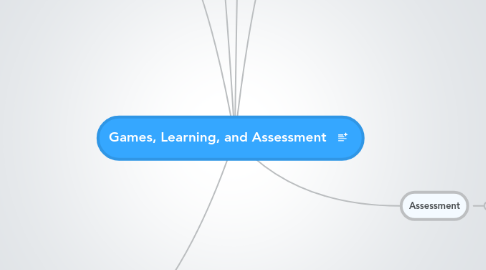
1. Elements of Good Games
1.1. Interactive problem solving
1.2. Specific rules and goals which player is emotionally attached
1.3. Ongoing feedback experiences that offer good learning opportunities
1.3.1. Control creates a sense of intimacy or feeling of power
1.3.2. make learning from experience more general and abstract
1.4. Adaptive challenges
1.4.1. match between affordance and effectivity
1.4.2. ability of player to carry out the action
1.4.3. allowing certain action to occur
1.5. Uncertainty
1.5.1. encouragement to enact their own unique path
1.6. Sensory stimuli
1.6.1. graphics
1.6.2. sounds
1.6.3. excite the senses
2. What are Games?
2.1. Structured or organized play
2.1.1. Unnecessary obstacles we volunteer to tackle
2.1.2. Follow a specific set of rules to attain a goal
2.1.3. Obstacles create a positive stress called eustress which provides us with the sense of motivation and desire to succeed.
2.2. Intrinsically motivation
2.3. Involves active cognitive and/or physical engagement
2.4. Allows for the freedom to fail and recover
2.5. To experiment
2.6. To fashion indentities
2.7. Freedom of effort and interpretation
3. Game Examples
3.1. Civilization
3.1.1. Goal of the game is to build, advance and protect a civiliation
3.1.2. To make successful decision
3.1.2.1. player needs to consider elements of human history, economy, geography, culture, technology advancement and war
3.1.3. What did the students master
3.1.3.1. historical facts
3.1.3.2. deep understanding about the intricate relationships involving geographical, historical, and economic systems within and across civilizations.
3.2. Epistemic
3.2.1. players virtually experience the same things that professional practitioners do i.e. engineer
3.2.2. based on the idea that learning means acquiring and adopting knowledge, skills, values, and identities
3.2.3. Urban Science a epistemic game, players develop landscape planning proposals for a mayor of the city
3.2.3.1. conduct a site visit interviewing virtual stakeholders
3.2.3.2. players need to consider various social and economic impacts
3.2.3.3. use special tools within the program to create the final geographic planning
3.2.3.4. write a final proposal to the mayor discussing strengths and weaknesses
3.3. Gamestar Mechanic
3.3.1. online game that teaches kids basic game design skills and build their own game
3.3.1.1. think about various games elements
3.3.1.2. parameters
3.3.1.3. interrelationships
3.3.2. innovative design skills
3.3.3. players did develop system thinking skills
3.4. Taiga Park and Science
3.4.1. online science content and inquiry skills
3.4.2. immersive digital game within a national park
3.4.3. the goal is to investigate why the fish are dying in Taiga River
3.4.3.1. players engage in scientific inquiry activities
3.4.3.2. interview virtual characters to gather information
3.4.3.3. collect water samples at several locations
3.4.3.4. player makes hypothesis and suggestions from the information collected
3.4.3.5. player needs to understand how certain science concepts are related to each other in order to advance in the game
3.4.3.6. player needs to think about how different social, ecological, and economical interest within the park
4. Learning is best when:
4.1. active
4.2. goal-oriented
4.3. contexutalized
4.4. interesting
4.5. interactive
4.6. provide ongoing feedback
4.7. grab and sustain attention
4.8. appropriate and adaptive levels of challenge
5. Learning defined:
5.1. lifelong process of
5.1.1. accessing
5.1.2. interpreting
5.1.3. evaluating
5.1.4. experiences
5.2. translating the information into
5.2.1. knowledge
5.2.2. skills
5.2.3. values
5.2.4. dispositions
5.3. Involves change
5.3.1. knowing
5.3.2. doing
5.3.3. believing
5.3.4. feeling
6. Assessment
6.1. Problems with Games
6.1.1. cannot be directly or easily measured by traditional assessment instruments
6.1.2. Implicit learning occurs when players not consciously intending to learn some content
6.2. Valid Assessments
6.2.1. Evidence Centered Design (ECD) 2 reasons it works
6.2.1.1. people learn in action
6.2.1.1.1. valid
6.2.1.1.2. reliable
6.2.1.1.3. invisible
6.2.1.2. strength resides in development of performance-based assessments
6.2.1.2.1. competency
6.2.1.2.2. evidence
6.2.1.2.3. tasks
